Alumni Awards
The Johns Hopkins Medicine Alumni Association presents awards each year during the Johns Hopkins School of Medicine Reunion and Alumni Weekend. These prestigious awards recognize distinguished alumni and faculty for their outstanding achievements and honor influential members of the Johns Hopkins Medicine family.
Johns Hopkins Medicine Alumni Association
Now accepting 2024 award nominations! Nominations are due by December 31, 2023.
The Distinguished Medical Alumnus/Alumna Award
Honors alumni (degree recipients, current and former faculty, fellows and house staff) of the Johns Hopkins University School of Medicine and The Johns Hopkins Hospital who have demonstrated excellence and achievement through their personal and professional accomplishments.
The Samuel P. Asper Award for Achievement in Advancing International Medical Education
The Asper Award was established in honor of the vision of the late Samuel P. Asper, M.D. '40. A renowned Hopkins Educator and physician, he served as Dean of the American University of Beirut School of Medicine in the mid-to-late 1970's. Dr. Asper believed that the Hopkins-trained physicians who are dedicated to fostering excellent medical care and education in a foreign country are continuing the outreach effort of Dr. William Osler, who traveled to China to assist in establishing Peking Medical Union College, and deserved recognition for their efforts. The Asper Award is presented annually during the meeting of the Johns Hopkins Medicine Alumni Association to a member of the Association who has had a significant impact on the health and education of those in foreign countries.
-
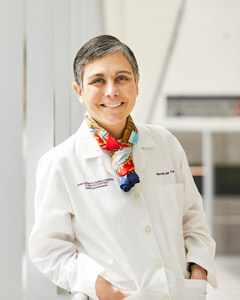 Dr. Marcela del Carmen is the president of the Massachusetts General Physician Organization at the Massachusetts General Hospital. She has led over 3,200 physicians in efforts to promote global access to health care, improve physician wellness, increase diversity and inclusion within the institution, and improve healthcare delivery quality. Born in Managua, Nicaragua, and having fled during the revolution that overthrew the Somoza dictatorship, Dr. del Carmen has dedicated her research to the study of disparities in gynecologic cancer outcomes in underserved communities. She also mentors underrepresented students through Mass General’s Summer Research Training Program. Since 2015, she has been a professor of obstetrics, gynecology, and reproductive biology at the Harvard Medical School—the first woman and Latino to ascend to the academic rank of professor in this specialty and in gynecologic oncology at Harvard Medical School. Dr. del Carmen also serves as a fellow of the American College of Obstetricians and Gynecologists and the American College of Surgeons, and as a full member of the Society of Gynecologic Oncology, the International Gynecologic Cancer Society, and the New England Society of Gynecologic Oncologists.
Dr. Marcela del Carmen is the president of the Massachusetts General Physician Organization at the Massachusetts General Hospital. She has led over 3,200 physicians in efforts to promote global access to health care, improve physician wellness, increase diversity and inclusion within the institution, and improve healthcare delivery quality. Born in Managua, Nicaragua, and having fled during the revolution that overthrew the Somoza dictatorship, Dr. del Carmen has dedicated her research to the study of disparities in gynecologic cancer outcomes in underserved communities. She also mentors underrepresented students through Mass General’s Summer Research Training Program. Since 2015, she has been a professor of obstetrics, gynecology, and reproductive biology at the Harvard Medical School—the first woman and Latino to ascend to the academic rank of professor in this specialty and in gynecologic oncology at Harvard Medical School. Dr. del Carmen also serves as a fellow of the American College of Obstetricians and Gynecologists and the American College of Surgeons, and as a full member of the Society of Gynecologic Oncology, the International Gynecologic Cancer Society, and the New England Society of Gynecologic Oncologists. Dr. del Carmen has authored over 250 papers in peer-reviewed literature. She is widely recognized for her research on identifying risk factors and optimal treatment strategies for patients with rare gynecologic tumors, and the development of novel surgical approaches for the treatment of women with ovarian cancer. Throughout her career, Dr. del Carmen has received numerous teaching and service awards, including the National Council on Resident Education in Obstetrics and Gynecology (CREOG) Award, the Howard Ulfelder Teaching Award, the CINE Golden Eagle Award, and CBS Cares. In 2022, the Boston Chamber of Commerce selected Dr. del Carmen as the recipient of the Achievement in Health Care & Life Sciences award.
-
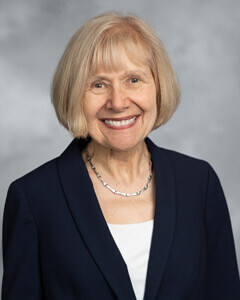 Dr. Eva Feldman is the director of the ALS Center of Excellence and NeuroNetwork for Emerging Therapies at the University of Michigan. She also serves as the University of Michigan James W. Albers Distinguished University Professor and the Russell N. DeJong Professor of Neurology at Michigan Medicine. Since joining the University of Michigan’s faculty in 1988, Dr. Feldman has trained over 100 postdoctoral neuroscience fellows and neurologists specializing in neurodegenerative diseases, and founded and directed the school’s A. Alfred Taubman Medical Research Institute for almost a decade.
Dr. Eva Feldman is the director of the ALS Center of Excellence and NeuroNetwork for Emerging Therapies at the University of Michigan. She also serves as the University of Michigan James W. Albers Distinguished University Professor and the Russell N. DeJong Professor of Neurology at Michigan Medicine. Since joining the University of Michigan’s faculty in 1988, Dr. Feldman has trained over 100 postdoctoral neuroscience fellows and neurologists specializing in neurodegenerative diseases, and founded and directed the school’s A. Alfred Taubman Medical Research Institute for almost a decade.Dr. Feldman completed her neurology residency at Johns Hopkins Hospital in 1987, where she served as chief resident, and was the first neurologist to receive the Johns Hopkins Award for Medical Teaching and Excellence. She also previously served as president of the American Neurological Association and the Peripheral Nerve Society, chair of the National Academy of Medicine Neurology and Psychiatry Section, and member of the Johns Hopkins Hospital Society of Scholars. For her excellence in teaching, leadership in landmark clinical trials, and groundbreaking research in neurological disorders, Dr. Feldman received numerous accolades. She is the only individual to receive the University of Michigan’s Early Distinguished Career Award, Distinguished Faculty Achievement Award, and Distinguished Alumna Achievement Award. She is also the first woman to receive the American Clinical Neurophysiological Society’s Robert S. Schwab Award. She was the principal investigator of two first-ever FDA approved human clinical trials of intraspinal stem cell implantation therapy for ALS. Dr. Feldman has published over 500 articles and 5 books.
-
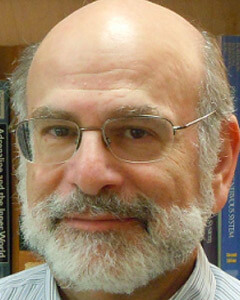 Dr. David Goldstein is a senior investigator in the National Institute of Neurological Disorders and Stroke (NINDS) and an attending physician at the Clinical Center of the National Institutes of Health (NIH). He came to the NIH as a Clinical Associate in the National Heart, Lung, and Blood Institute and obtained tenure in 1984. In 1990, he joined NINDS to head the Clinical Neurochemistry Section. He later founded, and has since directed, the Clinical Neurocardiology Section (renamed the Autonomic Medicine Section in 2019). He has received the Distinguished Investigator Award of the Society of Clinical and Translational Science, the Schatz Award in Autonomic Disorders of the American Academy of Neurology, the NIH Distinguished Clinical Teacher Award, and two NINDS Director’s Awards for Mentorship.
Dr. David Goldstein is a senior investigator in the National Institute of Neurological Disorders and Stroke (NINDS) and an attending physician at the Clinical Center of the National Institutes of Health (NIH). He came to the NIH as a Clinical Associate in the National Heart, Lung, and Blood Institute and obtained tenure in 1984. In 1990, he joined NINDS to head the Clinical Neurochemistry Section. He later founded, and has since directed, the Clinical Neurocardiology Section (renamed the Autonomic Medicine Section in 2019). He has received the Distinguished Investigator Award of the Society of Clinical and Translational Science, the Schatz Award in Autonomic Disorders of the American Academy of Neurology, the NIH Distinguished Clinical Teacher Award, and two NINDS Director’s Awards for Mentorship.Dr. Goldstein is the author of more than 650 cited publications and several books. His scientific work includes founding the field of clinical catecholamine neurochemistry and the practice of using positron emission tomography for sympathetic neuroimaging, the introduction of clinical physiological tests to enhance automatic function assessments in several disorders, and the promulgation of a cohesive concept that refines stress and distress as medical scientific ideas. In 1997, Dr. Goldstein and a team of investigators provided key evidence that Parkinson’s disease is a generalized disorder that involves a form of dysautonomia characterized by cardiac noradrenergic deficiency.
-
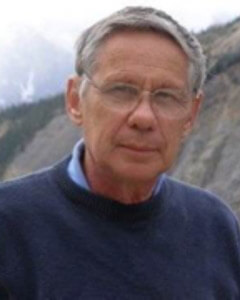 Dr. David Jackson is the president of Jackson and Associates, Inc., a healthcare consulting firm focusing on quality of care issues, especially in geriatrics and post-hospital care settings. He earned his Ph.D. in neurophysiology with Dr. Phillip Bard from the Johns Hopkins University School of Medicine in 1966 with distinction. He then became professor of medicine and director of critical care medicine at Case Western Reserve. He later returned to Hopkins to serve as an adjunct professor of geriatric medicine and served on the admissions committee for almost two decades. A leader in national healthcare, public health, and health policy, Dr. Jackson has led quality monitoring and improvement efforts in geriatric care in over 30 states for state government agencies, for many provider organizations, and for an agent of the court. He also served as the director of the Ohio Department of Health from 1983 to 1986.
Dr. David Jackson is the president of Jackson and Associates, Inc., a healthcare consulting firm focusing on quality of care issues, especially in geriatrics and post-hospital care settings. He earned his Ph.D. in neurophysiology with Dr. Phillip Bard from the Johns Hopkins University School of Medicine in 1966 with distinction. He then became professor of medicine and director of critical care medicine at Case Western Reserve. He later returned to Hopkins to serve as an adjunct professor of geriatric medicine and served on the admissions committee for almost two decades. A leader in national healthcare, public health, and health policy, Dr. Jackson has led quality monitoring and improvement efforts in geriatric care in over 30 states for state government agencies, for many provider organizations, and for an agent of the court. He also served as the director of the Ohio Department of Health from 1983 to 1986.Active in healthcare politics, Dr. Jackson was elected as a delegate to the Democrat National Convention in 1980 and 1992, and has lent his health policy expertise to several political campaigns. In 1973, Dr. Jackson became a White House Fellow, and in 1993, he became a member of the White House Task Force for Health Care Reform. He has founded two start-ups—APACHE Medical Systems, Inc. and AssurQual, Inc./HealthWare Solutions International, Inc.—one of which went public and was listed on NASDAQ.
-
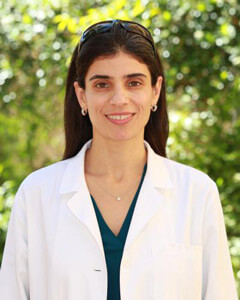 Dr. Eveline Hitti is the chair of the Department of Emergency Medicine and a professor of clinical emergency medicine at the American University of Beirut Medical Center in Lebanon. In 2009, Dr. Hitti returned to Lebanon, her country of birth, where she transformed the medical center’s small emergency medicine and acute care clinical operation into the largest emergency medicine academic department in the region. This includes expanded clinical services, the only toxicology service in the country, ACGME-I accredited training programs, and leading scholarly output in emergency medicine care. She also serves as a consulting physician surveyor for the Joint Commission International and an attending physician at the American University of Beirut.
Dr. Eveline Hitti is the chair of the Department of Emergency Medicine and a professor of clinical emergency medicine at the American University of Beirut Medical Center in Lebanon. In 2009, Dr. Hitti returned to Lebanon, her country of birth, where she transformed the medical center’s small emergency medicine and acute care clinical operation into the largest emergency medicine academic department in the region. This includes expanded clinical services, the only toxicology service in the country, ACGME-I accredited training programs, and leading scholarly output in emergency medicine care. She also serves as a consulting physician surveyor for the Joint Commission International and an attending physician at the American University of Beirut.Dr. Hitti served as an executive committee member for the Mediterranean Emergency Medicine Congress in 2022 and 2023 and co-founded the Lebanese Academy of Emergency Medicine—a subsidiary chapter of the American Academy of Emergency Medicine (AAEM). For her impact on Emergency Medicine and supporting AAEM’s mission, Dr. Hitti was recently awarded the AAEM David Wager Award (2023); for her leadership in developing a unified vision and teaching infrastructure, and operationalizing and supporting the Department of Emergency Medicine at the American University of Beirut through its infancy, Dr. Hitti was awarded the Dr. Cristina Costin International Emergency Medicine Leadership Award by the American Academy of Emergency Medicine. She is also a recipient of the International Emergency Medicine Research Excellence Award by the Center for International Emergency, Disaster and Refugee Studies at the Johns Hopkins Bloomberg School of Public Health, and the Excellence in Emergency Medicine Award by the Society of Academic Emergency Medicine.
Johns Hopkins University Alumni Association
While the awards above are specific to Medicine, the Johns Hopkins Medicine Alumni Association awards are open to all Johns Hopkins University alumni. There are six categories of awards to honor outstanding alumni, faculty, and friends of Johns Hopkins. Learn More
Distinguished Alumni Awards
-
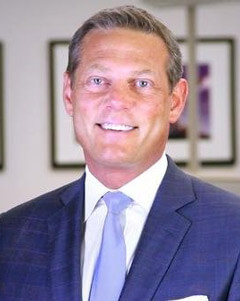 Bruce Blausen earned his Master of Arts in Medical and Biological Illustration from the Johns Hopkins University School of Medicine in 1987. In 1991, he founded Blausen Medical after recognizing the growing commercial and educational need for more accessible methods of illustrating and animating medical processes and functions. Today, Blausen Medical makes its extensive library content, consisting of over 32,000 images, available for multiple platforms. The award-winning animation library is now viewed around the world and has been translated in over 213 languages. Mr. Blausen’s latest endeavor includes developing educational virtual reality apps and interactive online textbooks using its extensive stock library. Mr. Blausen’s first book, The Complete Blausen Human Anatomy & Physiology Experience, was released in 2021. The book is designed for visual learners and contains over 600 animations, 300 images, 150 3-D rotatable models and more. Mr. Blausen is also working with Johns Hopkins on an education initiative to create greater racial diversity in the imagery as well as to rewrite the content for a lower reading level. Mr. Blausen is honored to work with his alma mater on such an important project for improving literacy and equality in health education.
Bruce Blausen earned his Master of Arts in Medical and Biological Illustration from the Johns Hopkins University School of Medicine in 1987. In 1991, he founded Blausen Medical after recognizing the growing commercial and educational need for more accessible methods of illustrating and animating medical processes and functions. Today, Blausen Medical makes its extensive library content, consisting of over 32,000 images, available for multiple platforms. The award-winning animation library is now viewed around the world and has been translated in over 213 languages. Mr. Blausen’s latest endeavor includes developing educational virtual reality apps and interactive online textbooks using its extensive stock library. Mr. Blausen’s first book, The Complete Blausen Human Anatomy & Physiology Experience, was released in 2021. The book is designed for visual learners and contains over 600 animations, 300 images, 150 3-D rotatable models and more. Mr. Blausen is also working with Johns Hopkins on an education initiative to create greater racial diversity in the imagery as well as to rewrite the content for a lower reading level. Mr. Blausen is honored to work with his alma mater on such an important project for improving literacy and equality in health education. -
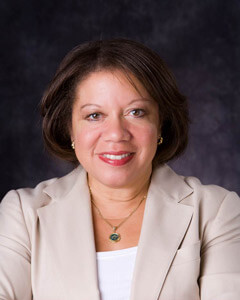 Dr. Lisa Egbuonu Davis is the vice president of medical innovations at DH Diagnostics, a Danaher company, and interim chief medical officer at Beckman Coulter Diagnostics, and is the former chief medical officer of Leica Biosystems. She serves as board director for Omega Healthcare and is on the board of trustees for Johns Hopkins Medicine. Dr. Egbuonu-Davis received her medical and public health degrees at Johns Hopkins in 1983. She was part of the first groups of Black students recruited by Dr. Levi Watkins and joined her classmates in honoring Dr. Watkins with an endowed scholarship. She has served on the School of Education’s board of advisors and the Bloomberg School of Health advisory board. She has focused on reducing health and educational disparities faced by minority and disadvantaged youth, while also working with nonprofits to enhance the future pipeline of minority students in science and medicine. Professionally, she is a senior executive with extensive leadership experience in the biopharmaceutical industry, public health, and consulting. Her experience includes line management of large multidisciplinary global research staff and budgets, merger and acquisition management, licensing and portfolio decisions, and public, private, and academic partnership development. Dr. Egbuonu-Davis has worked most of her professional life to increase access to medicine on a global scale and decrease identified health disparities.
Dr. Lisa Egbuonu Davis is the vice president of medical innovations at DH Diagnostics, a Danaher company, and interim chief medical officer at Beckman Coulter Diagnostics, and is the former chief medical officer of Leica Biosystems. She serves as board director for Omega Healthcare and is on the board of trustees for Johns Hopkins Medicine. Dr. Egbuonu-Davis received her medical and public health degrees at Johns Hopkins in 1983. She was part of the first groups of Black students recruited by Dr. Levi Watkins and joined her classmates in honoring Dr. Watkins with an endowed scholarship. She has served on the School of Education’s board of advisors and the Bloomberg School of Health advisory board. She has focused on reducing health and educational disparities faced by minority and disadvantaged youth, while also working with nonprofits to enhance the future pipeline of minority students in science and medicine. Professionally, she is a senior executive with extensive leadership experience in the biopharmaceutical industry, public health, and consulting. Her experience includes line management of large multidisciplinary global research staff and budgets, merger and acquisition management, licensing and portfolio decisions, and public, private, and academic partnership development. Dr. Egbuonu-Davis has worked most of her professional life to increase access to medicine on a global scale and decrease identified health disparities. -
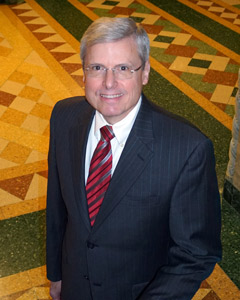 Dr. Bruce Fye has had a remarkable three-part career as an internationally recognized cardiologist, historian of medicine, and medical bibliophile. He holds three degrees from Hopkins: A.B. (1968, Phi Beta Kappa), M.D. (1972, Alpha Omega Alpha), and an M.A. in the History of Medicine (1978). He also did a fellowship in cardiology at Hopkins, where he was a Robert Wood Johnson Clinical Scholar (1976-1978). Experiences and mentors at Johns Hopkins helped him establish and expand his unique career path. In 1978, he joined the Marshfield Clinic (Wisconsin), where he founded the echocardiography laboratory and served as chair of the cardiology department for 18 years. From 2000 until his retirement in 2014, he was a cardiologist and professor of medicine and the history of medicine at Mayo Clinic. He has published three books and more than 100 historical and biographical papers. Dr. Fye has been president of the American College of Cardiology, the American Osler Society, and the American Association for the History of Medicine, which awarded him the Welch Medal (best book) and Lifetime Achievement Award. A medical book collector since his days at Hopkins, Dr. Fye has donated 15,000 medical books to Mayo Clinic and has donated what was considered to be the best private collection of cardiovascular books to the Huntington Library.
Dr. Bruce Fye has had a remarkable three-part career as an internationally recognized cardiologist, historian of medicine, and medical bibliophile. He holds three degrees from Hopkins: A.B. (1968, Phi Beta Kappa), M.D. (1972, Alpha Omega Alpha), and an M.A. in the History of Medicine (1978). He also did a fellowship in cardiology at Hopkins, where he was a Robert Wood Johnson Clinical Scholar (1976-1978). Experiences and mentors at Johns Hopkins helped him establish and expand his unique career path. In 1978, he joined the Marshfield Clinic (Wisconsin), where he founded the echocardiography laboratory and served as chair of the cardiology department for 18 years. From 2000 until his retirement in 2014, he was a cardiologist and professor of medicine and the history of medicine at Mayo Clinic. He has published three books and more than 100 historical and biographical papers. Dr. Fye has been president of the American College of Cardiology, the American Osler Society, and the American Association for the History of Medicine, which awarded him the Welch Medal (best book) and Lifetime Achievement Award. A medical book collector since his days at Hopkins, Dr. Fye has donated 15,000 medical books to Mayo Clinic and has donated what was considered to be the best private collection of cardiovascular books to the Huntington Library. -
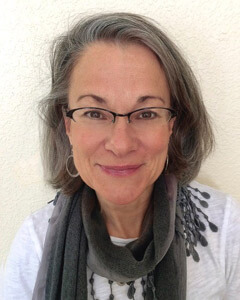 Dr. Jane Oski is a staff pediatrician at the Tuba City Regional Health Care Corporation and Sacred Peaks Health Center, and an adjunct clinical instructor in pediatrics at the Johns Hopkins University School of Medicine. Dr. Oski joined the Tuba City Regional Health Care Corporation in 1998 as a staff pediatrician in the Tuba City Indian Medical Center before becoming director of the center’s adolescent health services program. She fostered public health initiatives and led innovative efforts and dedicated advocacy on behalf of Native American children. She currently serves as chair of the Indian Health Special Interest Group for the American Academy of Pediatrics Committee on Native American Child Health, member of the Arizona Chapter of the American Academy of Pediatrics Vaccines for Children Committee, chair of the Tuba City Regional Health Care Infection Prevention Committee, and co-chair of the Tuba City Regional Health Care Epidemic Response Team.
Dr. Jane Oski is a staff pediatrician at the Tuba City Regional Health Care Corporation and Sacred Peaks Health Center, and an adjunct clinical instructor in pediatrics at the Johns Hopkins University School of Medicine. Dr. Oski joined the Tuba City Regional Health Care Corporation in 1998 as a staff pediatrician in the Tuba City Indian Medical Center before becoming director of the center’s adolescent health services program. She fostered public health initiatives and led innovative efforts and dedicated advocacy on behalf of Native American children. She currently serves as chair of the Indian Health Special Interest Group for the American Academy of Pediatrics Committee on Native American Child Health, member of the Arizona Chapter of the American Academy of Pediatrics Vaccines for Children Committee, chair of the Tuba City Regional Health Care Infection Prevention Committee, and co-chair of the Tuba City Regional Health Care Epidemic Response Team. In 2017, for her work in fostering public health initiatives and her impact on Native American adolescents, Dr. Oski was awarded the Community Hero Award from the Johns Hopkins University Alumni Association—an award recognizing outstanding contributions that address critical social, economic, and environmental needs throughout our society and communities. She has published over nine works, two texts, and two book chapters, and has previously served on the editorial boards of The Journal of Pediatrics, Contemporary Pediatrics, and the Physicians for DHA Newsletter.
Community Champion Award
This award recognizes outstanding contributions that address critical social, economic and environmental needs throughout our society and communities, including local communities. Both individuals and groups are eligible. The nominee(s) may be either Johns Hopkins alumni (individual or group) who have impacted any community OR non-alumni (individual or group) who have impacted a Johns Hopkins institution.
Heritage Award
This award honors alumni and friends of Johns Hopkins who have contributed outstanding service over an extended period to the progress of the university or the activities of the Alumni Association.
-
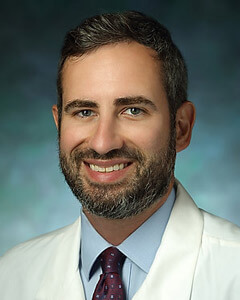 Dr. C. Nicholas Cuneo is the co-founder and medical director of the Johns Hopkins, Esperanza, Asylee Women Enterprise, and Loyola (HEAL) Refugee Health and Asylum Collaborative, which serves immigrant survivors of torture and trauma seeking refuge in the United States. In addition to offering Maryland’s first and only asylum clinic, which provides pro bono forensic medicolegal evaluations for individuals applying for asylum, the HEAL Collaborative delivers responsive health care and supportive services to survivors and assists them in navigating social service agencies.
Dr. C. Nicholas Cuneo is the co-founder and medical director of the Johns Hopkins, Esperanza, Asylee Women Enterprise, and Loyola (HEAL) Refugee Health and Asylum Collaborative, which serves immigrant survivors of torture and trauma seeking refuge in the United States. In addition to offering Maryland’s first and only asylum clinic, which provides pro bono forensic medicolegal evaluations for individuals applying for asylum, the HEAL Collaborative delivers responsive health care and supportive services to survivors and assists them in navigating social service agencies.Dr. Cuneo began working with refugees in Baltimore while a student at the Johns Hopkins University School of Medicine. In 2011, he co-founded the Refugee Health Partnership, which pairs teams of medical students with recently resettled refugees to provide health care advocacy, mentorship, and navigation. After graduating from medical school in 2015, Dr. Cuneo completed a combined residency in internal medicine and pediatrics at Brigham and Women's Hospital and Boston Children's Hospital. He also earned a master's degree in public health from Harvard University in 2020. As global health equity chief resident there, he trained in forensic evaluation of asylum seekers at Massachusetts General Hospital and worked at the southern U.S. border in Tijuana, Mexico.
In the summer of 2020, Dr. Cuneo returned to Johns Hopkins as an assistant professor of medicine and pediatrics and made starting Baltimore’s first comprehensive refugee health and asylum clinic a priority. The collective has since received an outpouring of philanthropic and community support to aid in providing vital care to our most vulnerable populations.
-
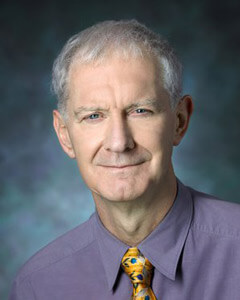 In pursuit of the mission of the Johns Hopkins Department of Anesthesiology and Critical Care Medicine, Dr. Daniel Nyhan has been a true champion, leader, and mentor who has served in multiple leadership, operations, and administration capacities for the past 40 years. Over 1,000 residents and fellows have benefitted from his teaching, experience, and mentorship. Countless individuals have been grateful for Dr. Nyhan’s insight, words of wisdom, and lessons about human behavior and civility.
In pursuit of the mission of the Johns Hopkins Department of Anesthesiology and Critical Care Medicine, Dr. Daniel Nyhan has been a true champion, leader, and mentor who has served in multiple leadership, operations, and administration capacities for the past 40 years. Over 1,000 residents and fellows have benefitted from his teaching, experience, and mentorship. Countless individuals have been grateful for Dr. Nyhan’s insight, words of wisdom, and lessons about human behavior and civility.Dr. Nyhan enhanced wellness at Johns Hopkins long before the term wellness was added to our vocabulary or agenda. His passion for teaching is unequaled, and his enthusiasm for sharing knowledge is contagious. His common-sense approach to difficult decision making is so effective, that doing the next right thing becomes intuitive. He has great appreciation for all, no matter where they fall on the academic or workplace hierarchy. Among his many accomplishments, Dr. Nyhan serves on the editorial board of the Journal of Cardiothoracic and Vascular Anesthesia and is a reviewer for the Anesthesiology journal. He was a member of the Johns Hopkins Faculty Senate and a member of several professional organizations, including the American Society of Anesthesiologists, Association of Cardiovascular Anesthesiologists, and he currently chairs the advisory committee to the Maryland Physician Health Program.
Johns Hopkins Women’s Medical Alumnae Association
Hall of Fame
The Hall of Fame was established in 1993 to recognize the contributions of the extraordinary women alumni and faculty of the Johns Hopkins University School of Medicine. It endeavors to bring to life the energy, enthusiasm and passions of these individuals so that generations to come will have insight into the wide variety of accomplishments achieved by women in medicine at Johns Hopkins.
Barbara Migeon, M.D.
Dr. Barbara Migeon was a trailblazing pioneer and professor emeritus in genetic medicine at the Johns Hopkins University School of Medicine. She was the sixth woman to reach the rank of professor at the School of Medicine. She is known for pioneering genetics work in sex determination, with a specific focus on the molecular basis of X-inactivation. She is also recognized for her research on the health and disease consequences of X inactivation, including mosaicism, and her cloning of human X chromosome fragments.
Following her completion of medical school at the University of Buffalo in 1956, Dr. Migeon joined the Johns Hopkins University School of Medicine Pediatrics Department for her internship and residency, and completed her fellowship under the direction of geneticist Dr. Barton Childs. In 1963, she joined the Pediatrics Department as an instructor and continued as a member of the Johns Hopkins University School of Medicine faculty until 2020. A dedicated and forward-thinking educator, Dr. Migeon was the founding director of the Johns Hopkins University School of Medicine’s human genetics graduate program. She was a strong advocate for women in science and served as a mentor and advisor for many. Dr. Migeon also served on various editorial boards and was the recipient of the 2016 March of Dimes/Colonel Harland D. Sanders Lifetime Achievement Award in Genetics.
Portraits Presented to the Johns Hopkins Medicine Community
The portrait collection of The Johns Hopkins Hospital and the Johns Hopkins University School of Medicine expands each year when distinguished faculty, trustees, directors, and others who have played a significant role at Johns Hopkins are honored through portraiture. The portrait collection honors the great educators, investigators, leaders, and philanthropic supports who have contributed to Johns Hopkins through giving of their time, talents, and energy.
-
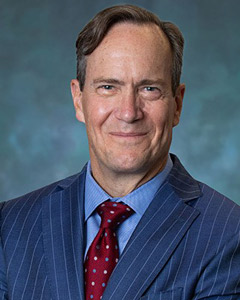 Dr. Anderson served as director of the Department of Medicine, the William Osler Professor of Medicine, and physician-in-chief of The Johns Hopkins Hospital. In leadership roles at Johns Hopkins from 2014 to 2022, he oversaw more than 700 full-time faculty members and clinicians across 18 academic divisions, nearly 3,000 staff members and trainees, 300,000 clinic visits, and an annual research portfolio of more than $200 million in the last year. He also led the Department of Medicine’s efforts in securing philanthropy, raising approximately $20 million to $40 million annually.
Dr. Anderson served as director of the Department of Medicine, the William Osler Professor of Medicine, and physician-in-chief of The Johns Hopkins Hospital. In leadership roles at Johns Hopkins from 2014 to 2022, he oversaw more than 700 full-time faculty members and clinicians across 18 academic divisions, nearly 3,000 staff members and trainees, 300,000 clinic visits, and an annual research portfolio of more than $200 million in the last year. He also led the Department of Medicine’s efforts in securing philanthropy, raising approximately $20 million to $40 million annually.A renowned scholar, physician and caregiver, Dr. Anderson’s research, commitment to education, and medical leadership have earned international recognition. He is a leading expert on the mechanisms of cardiac arrhythmias and heart failure, conducting research focused on the role of the calmodulin-dependent protein kinase II in heart failure and cardiac arrhythmias, which are a common cause of sudden cardiac death. He has published more than 160 peer-reviewed journal articles, book chapters and book reviews. In 2017, he was elected to the National Academy of Medicine.
Dr. Anderson is now the Executive Vice President for Medical Affairs, Dean of the Division of the Biological Sciences (BSD), and Dean of the Pritzker School of Medicine at the University of Chicago, where he heads the medical and biological research, education, care delivery, and community-engagement enterprises. He leads the UChicago Medicine health system as the Executive Vice President of the University of Chicago for Medical Affairs.
-
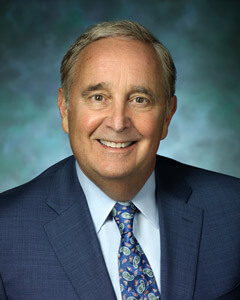 Dr. Richard Bennet was the president of Johns Hopkins Bayview Medical Center (2009-2022) and held the Raymond & Anna Lublin Chair in Geriatric Medicine in the Johns Hopkins University School of Medicine (1999-2009). He received his AB degree from Dartmouth College and his medical degree from the Johns Hopkins University School of Medicine. Dr. Bennett began his training in internal medicine at Baltimore City Hospitals (now Johns Hopkins Bayview Medical Center) in 1982. Following fellowship training in the Johns Hopkins program in geriatric medicine and gerontology, he helped develop innovative new models of care for older patients and described a number of new geriatrics conditions as a member of the full-time faculty for 25 years, trained future leaders in geriatric medicine as the director of the fellowship training program for 10 years, and provided administrative leadership and support for aging programs across Johns Hopkins Medicine throughout the course of his multi-decade career. His focus as the medical center president was to enhance the clinical, education, and research programs on the Johns Hopkins Bayview campus, and to improve the health of the neighbors and neighborhoods served by the hospital. He is the co-author of the book Building Healthy Communities Through Medical-Religious Partnerships which describes how hospitals and faith communities can partner to take health education into the community and address health inequities.
Dr. Richard Bennet was the president of Johns Hopkins Bayview Medical Center (2009-2022) and held the Raymond & Anna Lublin Chair in Geriatric Medicine in the Johns Hopkins University School of Medicine (1999-2009). He received his AB degree from Dartmouth College and his medical degree from the Johns Hopkins University School of Medicine. Dr. Bennett began his training in internal medicine at Baltimore City Hospitals (now Johns Hopkins Bayview Medical Center) in 1982. Following fellowship training in the Johns Hopkins program in geriatric medicine and gerontology, he helped develop innovative new models of care for older patients and described a number of new geriatrics conditions as a member of the full-time faculty for 25 years, trained future leaders in geriatric medicine as the director of the fellowship training program for 10 years, and provided administrative leadership and support for aging programs across Johns Hopkins Medicine throughout the course of his multi-decade career. His focus as the medical center president was to enhance the clinical, education, and research programs on the Johns Hopkins Bayview campus, and to improve the health of the neighbors and neighborhoods served by the hospital. He is the co-author of the book Building Healthy Communities Through Medical-Religious Partnerships which describes how hospitals and faith communities can partner to take health education into the community and address health inequities.His decades of service to Johns Hopkins were recognized by receipt of a Johns Hopkins University Alumni Association Distinguished Alumnus Award in 2009, a Johns Hopkins Diversity Recognition Award from the Leadership Council & University President in 2011, and a Johns Hopkins Heritage Award for exceptional devotion from the Johns Hopkins University Alumni Association in 2017.
-
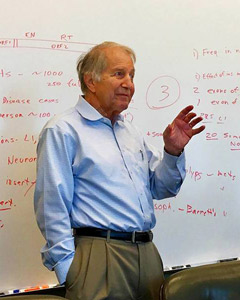 Dr. Haig Kazazian received his undergraduate degree from Dartmouth College. His first two years of medical school were also at Dartmouth with the final two years at the Johns Hopkins University School of Medicine, graduating in 1962 followed by residency in pediatrics at the University of Minnesota and The Johns Hopkins Hospital. Finally, he completed training in human genetics at Johns Hopkins and the National Institutes of Health.
Dr. Haig Kazazian received his undergraduate degree from Dartmouth College. His first two years of medical school were also at Dartmouth with the final two years at the Johns Hopkins University School of Medicine, graduating in 1962 followed by residency in pediatrics at the University of Minnesota and The Johns Hopkins Hospital. Finally, he completed training in human genetics at Johns Hopkins and the National Institutes of Health.In 1969, Kazazian joined the Johns Hopkins faculty. During his career, he established the first DNA diagnostic laboratory and directed the Division of Pediatrics Genetics and the Center for Medical Genetics at The Johns Hopkins Hospital. Kazazian left Johns Hopkins in 1994 to chair the Genetics Department at the University of Pennsylvania School of Medicine until 2006 and retired in 2010. Then, Kazazian returned to Johns Hopkins to continue research at the McKusick-Nathans Institute of Genetic Medicine. He remained on the faculty at Johns Hopkins as professor of genetic medicine, pediatrics, and molecular biology and genetics until his death in 2022. Born to Armenian parents who survived genocide during World War I, Kazazian directed several genetics services at Johns Hopkins and made pivotal discoveries in human genetics, including identifying the molecular basis of hemoglobin disorders, hemophilia, and the role of mobile DNA elements known as transposons, or “jumping genes,” in human disease. Scores of scientists trained in Kazazian’s laboratory, including more than 25 postdoctoral fellows. He published more than 400 peer-reviewed journal articles and a book, Mobile DNA: Finding Treasure in Junk.
-
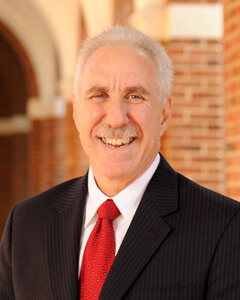 Dr. Paul Rothman recently retired after 10 years as the dean and CEO of Johns Hopkins Medicine. A rheumatologist and molecular immunologist, he came to Hopkins in July 2012 after having served as dean of the College of Medicine at the University of Iowa. Previously, he served as head of Internal Medicine at Iowa, and prior to that as vice chairman for research and founding director of the Division of Pulmonary, Allergy and Critical Care Medicine at Columbia University College of Physicians and Surgeons, where he joined the faculty in 1990.
Dr. Paul Rothman recently retired after 10 years as the dean and CEO of Johns Hopkins Medicine. A rheumatologist and molecular immunologist, he came to Hopkins in July 2012 after having served as dean of the College of Medicine at the University of Iowa. Previously, he served as head of Internal Medicine at Iowa, and prior to that as vice chairman for research and founding director of the Division of Pulmonary, Allergy and Critical Care Medicine at Columbia University College of Physicians and Surgeons, where he joined the faculty in 1990. A 1980 Phi Beta Kappa graduate of MIT, Rothman received his medical degree from Yale University in 1984, earning a place in the AOA Honor Medical Society. He then trained at Columbia-Presbyterian Medical Center in internal medicine and rheumatology and accepted a postdoctoral fellowship at Columbia University prior to joining its medical school faculty.
Rothman's research focused on immune system molecules known as cytokines. Specifically, he investigated the role these molecules play in the normal development of blood cells, as well as the abnormal development of these blood cell that leads to leukemia. His work was consistently funded by the National Institutes of Health.
His honors include a Pew Scholar Award and the Pharmacia Allergy Research Foundation International Award in 1997. Dr. Rothman is a member of the National Academy of Medicine, the American Academy of Arts and Sciences, the American Association for the Advancement of Sciences and the ASCI. He is a member of the Association of American Physicians and served as President in 2014.
If you have any questions, please contact us at [email protected].